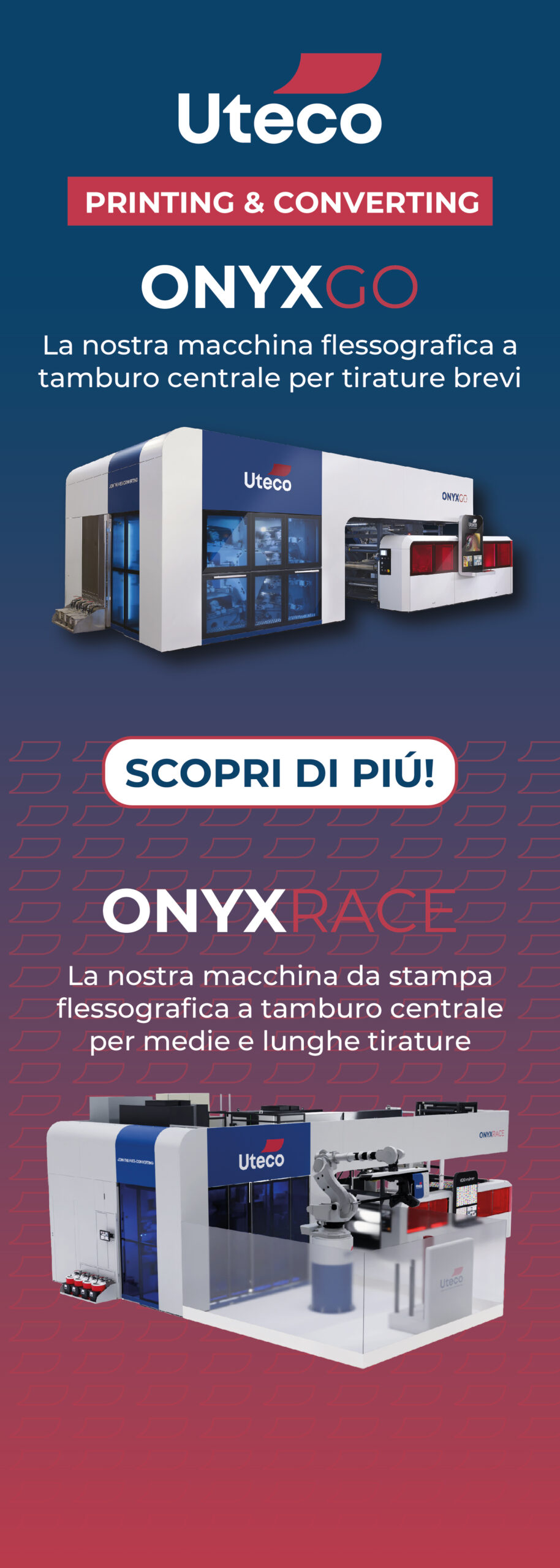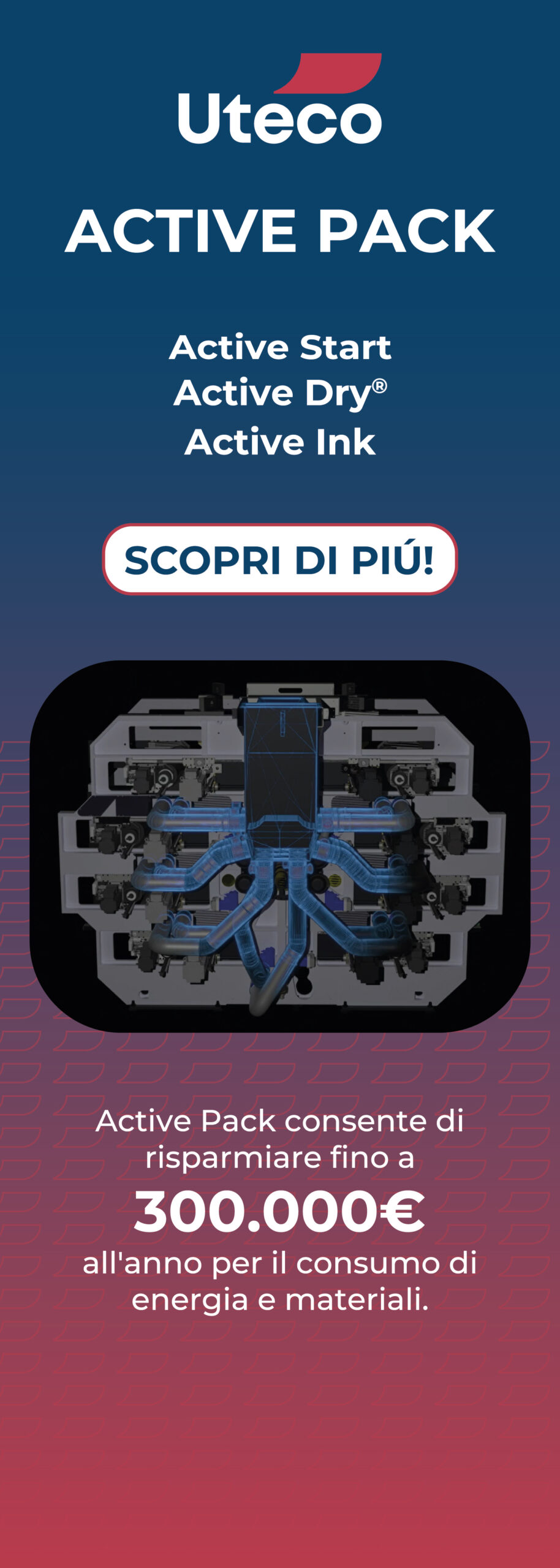The world of printing today demands sustainable solutions. Renewink is the answer.
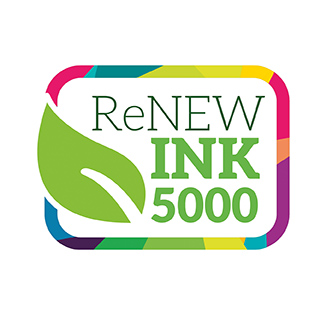
The Global demand for printing inks is approximately 25 million tons per year; the majority of which concerns inks formulated with vegetable solvents derived from palm oil, soy, coconut, etc. These inks are primarily used for printing on food packaging and are based on esters of vegetable oils. Therefore, they are solvents that use oils derived from crops that contribute to deforestation, biodiversity loss, and soil depletion for the cultivation of oils used in the food industry, thus affecting the supply chain and the cost of food products. Ultimately, oils from the food industry are being used for non-food purposes.
“ReNewInk” stems from the synergy between IPINKS, the ISusChem Start-Up, and the Department of Chemical Sciences of Federico II of Naples, which, through the groups of Organometallic Chemistry and NICL, has been dealing with the conversion of waste oils and non-food oils for years. The goal is to reduce the environmental impact of inks: after a series of successful tests and publications, a family of “green” solvents derived from third-generation biomass residues (food waste or marginal crops) has been patented for the formulation of eco-compatible inks within a circular bio-economy perspective.
R&D
Observing the similarity between the molecules used in the printing inks produced by IPINKS since 2011 and the derivatives of waste oils developed in the laboratory by the University, the company has supported tests and studies since 2017 to understand if these new products could be integrated into the system instead of the less eco-friendly ones currently in use. The results were surprising; the solvent power of these new green bio-ingredients was found to be significantly superior to the products available on the market, and in 2019, the first major test production was initiated with positive effects both in printing on food packaging and for commercial and editorial products.
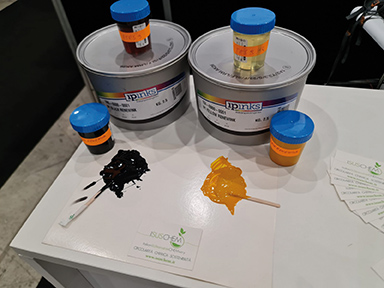
From this, the startup IsusChem was born, which, thanks also to significant funding from the European Community, private and public entities (such as the Terra Next accelerator and Invitalia), has built a plant to produce (European Patent EP7049428) on a semi-industrial scale this family of solvents derived from waste oils and marginal crops (European Patent EP3577173) such as thistle and safflower, which do not impact the food chain. Currently, ISusChem regularly supplies green bio-ingredients to IPINKS for the production of ReNewInk inks.
Innovation
Once the potential of this new family of solvents was recognized, IPINKS invested in and provided technological support for further studies at the University and for ISusChem in various application areas.
Additional patents have been developed in the graphic sector and beyond, involving both product and process innovation. Solvent washes for printing machines/surfaces have been created, and a low-cost recyclable catalyst has been developed and patented, providing esters for making UV inks.
The sectors where studies are ongoing range from cosmetics, such as formulations for sunscreens or hair treatment products, to the production of coatings for ceramics.
Competitive advantage
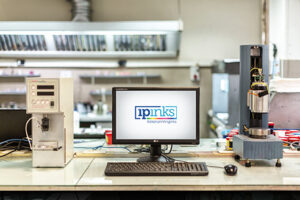
Sustainability is a global challenge crucial for the future of the planet. Therefore, it is fundamental to assess the environmental and socio-economic compatibility of innovative processes that are to be implemented. With this purpose, IPINKS commissioned an important Life Cycle Assessment (LCA) study from Cariplo Factory, which involved the in-depth analysis of the life cycle of printing inks formulated with traditional solvents and with the innovative solvents developed from sustainable vegetable oils. The results, though anticipated, were surprising: IPINKS innovations make printing products 40% more sustainable in terms of solvent usage and reduce CO2 emissions by over 50% in the printing ink production process, already achieving the goals of the 2030 agenda.
40-50% of the formulation of a printing ink, as mentioned earlier, although derived from a plant-based raw material, consumes land and competes with the cultivation of food products. Therefore, even though it is a vegetable raw material, it is not ethically or environmentally sustainable. Using esters derived from waste oils or marginal crops reduces environmental impact, increases ink sustainability and final packaging, adds value to used frying oil that would otherwise be thermally destroyed (thus producing CO2), and, in the case of marginal crops, gives new life and value to land that is no longer suitable for food cultivation.
Additionally, this also makes the packaging on which the ink is used more sustainable, up to 30% in terms of overall CO2 emissions. Important studies are in advanced stages, aiming to achieve greater recyclability of printed packaging through better removal of our ReNewInk inks.
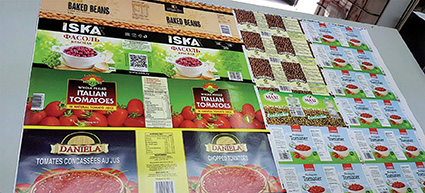
Another advantage of using these esters is that the production of printing inks is faster and less energy-consuming. Consider that the process of dissolving various components would take 4 hours at a temperature of 120°C, whereas with the new solvents, it is achieved in 30 minutes at a temperature of 80°C. Thanks to their extraordinary characteristics, these products not only replace something already existing but also open up new markets in both the printing sector and other industrial sectors.
The new “green” inks are safe and do not migrate into food, have an eco-toxicological profile that makes them suitable for use in food packaging. They are not flammable nor do they cause irritation. They do not require special precautions to be handled, another advantage for the safety of the operators who use them.
Applications
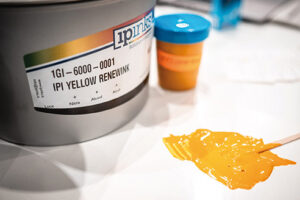 The inks produced by IPINKS with green bio-ingredients can be used on both coated and uncoated paper and cardboard, as well as on label paper and non-absorbent substrates such as biopolymer-coated board used in the paper cup industry. It is in this latter application where the greatest added value for our inks is evident because current inks are often highly viscous and difficult to machine. In contrast, ReNewInk inks have a significantly improved rheological profile compared to conventional offset inks, thus simplifying the printing process. This improvement is due to the exceptional solvent power of the bio-ingredients used by IPINKS, with the additional benefit for users of being able to operate effectively with a lower environmental impact.
The inks produced by IPINKS with green bio-ingredients can be used on both coated and uncoated paper and cardboard, as well as on label paper and non-absorbent substrates such as biopolymer-coated board used in the paper cup industry. It is in this latter application where the greatest added value for our inks is evident because current inks are often highly viscous and difficult to machine. In contrast, ReNewInk inks have a significantly improved rheological profile compared to conventional offset inks, thus simplifying the printing process. This improvement is due to the exceptional solvent power of the bio-ingredients used by IPINKS, with the additional benefit for users of being able to operate effectively with a lower environmental impact.
products are already available, and significant growth is expected in 2024 as the production of these solvents from sustainable vegetable oils is set to increase substantially, thanks to the key partner ISusChem, which, together with IPINKS, holds the intellectual property rights to the product and process. Both companies are strongly committed to sustainable industrial development for the environment and future generations.
Printing performace
The printing characteristics of these inks stem from the exceptional solvent power of the bio-ingredients used by IPINKS in formulating the ReNewInk series. This increased solvent power allows us to use highly flexible and high-performance formulations at high printing speeds with very rapid drying characteristics, even on non-absorbent substrates.
Thanks to our printing partner G.A.M. spa, we have been able to demonstrate all the expected characteristics of the new ReNewInk series and have even surpassed expectations.
G.A.M.’s exceptional experience and cutting-edge technology have allowed us to define the benefits for the end user in detail: the gloss of the final print increases by 35%, dot gain decreases by over 60%, fountain solution consumption decreases by 30%, machine stops for roller cleaning decrease by 50%, the inks remain fresh in the machine, and despite this, post-printing phases can be initiated in less than 4 hours thanks to the exceptional drying speed achieved without the need for additional dryers.
It’s a fact: the ReNewInk series ensures an exceptional ESG (Environmental, Social, and Governance) profile in terms of socio-economic and environmental sustainability while also being competitive in terms of price and highly innovative in terms of performance.






















